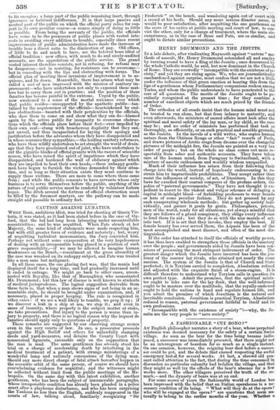HENRY DR1JMMOND AND THE JESUITS.
IN a late debate, after vindicating Maynooth against " untrue " me- thods of assault, Mr. Henry Drummond astonished all and sundry by turning round to have a fling at the Jesuits ; once denounced by the whole Catholic world, he said, but now dominant in the Church of Rome. They are avowedly "incompatible with the existence of so- ciety," and yet they are rising again. We, who are journalistically casehardened against surprise, must confess that we are not a little under the influence of that green emotion at hearing this from the lips of &gentleman whom Parliamentary companions reckon among Tories, and whom the public understands to have penetrated to the COM of all questions. The merits of the Jesuits ought to be pe- culiarly recognized at the present time ; for they combine a number of excellent objects which are much prized by the friends of Order.
The orthodox of all creeds insist that the human mind must not he trusted to run alone, but that from infancy to maturity, and even afterwards, the ministers of sacred affairs must look after the spiritual and moral safety of the lay man, or lay child, as the case may be ; and no order of ministers has performed that task so thoroughly, so efficiently, or on such practical and sensible grounds, as the Jesuits. In the novels of a wild writer, who copies human nature from the Chateau Rouge or other "fast" resorts of Paris, and draws pictures of Arctic crags from dreams over the changeful pictures of the midnight fire, the Jesuits are painted as a very lax order of people ; but on the whole no class comes out more re- spectably from sober and authentic accounts. They have taken care of the human mind, from Paraguay to Switzerland, with a mixture of ascetic enthusiasm and worldly wisdom unequalled.
Much of their influence has arisen from their following their charge into the world, instead of hopelessly endeavouring to re- strain him by impracticable prohibitions. They accept rather than resist the influences of society, of art, of literature. In this they have far excelled their coarser compeers of the profane orders, the police of "paternal governments." They have not thought it ex- pedient to resort to the violent and vulgar schemes of deluging a capital in midnight blood—of forbidding professors to wear beards or hats of some peculiar fashion. They do not proceed by any such exasperating wholesale methods; but gather up society indi- vidually, and garner it grain by grain. Philosophers, priests, men of the world, ready for all situations, yet always mindful that they are fellows of a grand conspiracy, they oblige every influence to lend them its aid ; but they do so with the nice morals of art- istic tad. If it is art that they invoke, they employ the best. If female beauty has ever served them the Aspasia has been of the most accomplished and most discreet, and often of the most dis- tinguished.
If the order has attached to itself the officials of worldly power, it has thus been enabled to strengthen those officials in the mastery over the people ; and governments aided by Jesuits have been con- scious of possessing the most stringent instrument of order. The greatest danger which the Jesuits have incurred has been the jea. lousy of the coarser lay rivals, who attained not nearly the same success. The system of the Jesuits is that of Church and State perfected ; it is Toryism carried to completion, Absolutism refined and adjusted with the exquisite finish of a steam-engine. It is difficult therefore to understand why Toryism calls in question its own perfect type. Admit the premises, that the spiritual minis- ter ought to take care for the lay flock, that the well-informed ought to be masters over the multitude, that the royally-endowed ought to hold the nations in hand and regulate human life and you admit the premises of which Jesuitism is the natural and inevitable conclusion. Jesuitism is practical Toryism, Absolutism reduced to reason, paternal government faithful to itself and its own professions. "Incompatible with the existence of society "1—why, the de- suits are the very people to "save society."


























 Previous page
Previous page